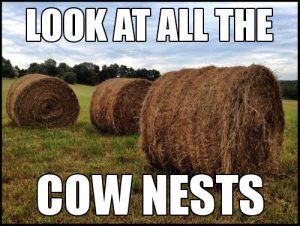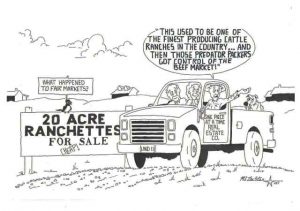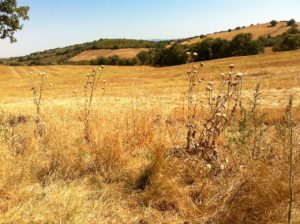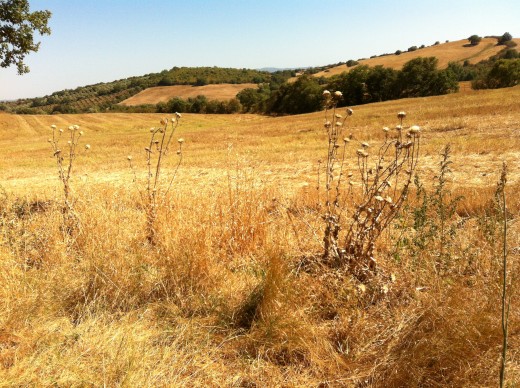 We love our neighbors. We’re just glad they’re a full section (640 acres = one mile) away.
We love our neighbors. We’re just glad they’re a full section (640 acres = one mile) away.
I had been fairly warned. When we brokered a deal to sell a piece of property adjoining our ranch to some folks from the city, Tammy, the sharp, suburban wife in the pair warned me: “we don’t have a clue about living in the country. We don’t even know what we don’t know.” At least she was being honest about it.
Then she added “But you wouldn’t have a clue about operating in my environment either.”
“Could be,” I mused to myself.
We had our fair share of apprehensions about the whole deal, but it seemed like a win/win. We would be able to continue to graze the property without having to buy it.
In addition to being a mile away, the other good thing was, Carl and Tammy weren’t actually going to try to “live” in the country. This was just their getaway — a place to go on weekends and holidays with their dogs, ATVs and grandkids — and maybe more when they retire, or SHTF.
But we quickly learned, they were absolutely right: They didn’t have a clue and didn’t even know what they didn’t know about living in the country. From the outset they were prone to panic about just about everything. They were really nervous about all the free-roaming cattle going up and down the Canyon Road — which is a 150 year-old stock trail leading to mountain grazing allotments They wondered if they should call 9-1-1. “No,: I responded, “there will be about 1000 head of cows and calves move up and down this road in the spring and then again in the fall. It’s nothing to panic about.”
The next thing Tammy wanted to know is where they needed to go to get a permit to ride their ATVs on their property. I told her they didn’t need a permit. But she responded “I thought the zoning ordinance says we have to have a permit to do anything of any nature on our property. . .and we’re afraid to do anything we don’t have permission to do. We know people have been riding horses here, but riding ATVs is a new use, and we don’t want to get in trouble.”
“Well, it’s up to you,” I responded, “if you want to make sure you have permission to do every little thing on your property, that’s up to you, but you’ll have to drive 50 miles to Delta to get a permit.” “You’re kidding!” she exclaimed, “I thought Fillmore was the county seat?!” “It is, but you’ll get used to it,” I said.
“What’s it like, dealing with the county government here?” Tammy wanted to know. “On one hand, it’s not bad,” I responded. “But that’s only part of the story — if you don’t really care about policy, and whether or not it makes sense . . . And, it all depends on WHO you are — there are major double standards — but if you don’t bother them, they probably won’t bother you. . . Much. . . If you have an opinion, though, you better keep it to yourself, because If you get at all outspoken, don’t go along just to get along, or try to stand-up for yourself, you might have problems, because they don’t seem to like people who rock the boat. . . . But if you’re a wallflower; if you just sit down, shut-up, and keep your nose clean, you should be just fine.” “Hhhmmm,” she sighed.
“Well, enough gossip and small talk,” Tammy said. “Where do we need to go get utilities — water and power — turned on? Not Delta, I hope!” she exclaimed. I told her there were no utilities connected to their property. For power, either they would have to run a new line to connect to the grid, or build a solar system. For water, they would  have to drill a well. “But we have water rights!?” Tammy protested. Yes, you have the right to drill a well, I responded. “You mean, like a wishing well?” she asked. “No, like a well that actually produces water,” I said.
have to drill a well. “But we have water rights!?” Tammy protested. Yes, you have the right to drill a well, I responded. “You mean, like a wishing well?” she asked. “No, like a well that actually produces water,” I said.
“Okay, this next question should be a lot simpler,” she said, “how far to the closest Walmart?” “Fifteen miles as the crow flies, I said, “but it takes an hour to get there.” “As the crow what?! . . . I don’t know if this is going to work . . . what about Sam’s Club?” “That one is simple,” I responded, “an hour and a half straight up the freeway.” She groaned and held her head in her hands.
Carl and Tammy have a nice camping spot on their place, where they park a camp trailer from spring to fall, along with an additional cargo trailer for extra storage, that they leave year-round. One day, during a week-long camp, Carl came to visit us. “We love to come down here,” he said, “but I’m really curious, how to people make a living? Obviously not everyone is involved in agriculture.” “You’re right,” I responded, “it’s a great place to live, but a tough place to make a living . . . and getting tougher all the time it seems. We’re on track to lose about 200 of the best paying jobs in the county. And lot of people already have to commute quite a ways for work.” “What’s that going to do to my property taxes,” asked Carl?
The next spring when we visited, Tammy asked Mac if she could pay him to mow down all the grass and sagebrush on the entire property. “What for?” he asked. “So there’s no place for snakes to hide,” she responded. We had been leasing the property for grazing before it was sold to Carl & Tammy, and we had made a deal with them to continue grazing it to preserve the greenbelt status, so Mac wasn’t necessarily excited about doing away with all the vegetation. Tammy said she actually wanted to have the whole place — 40 acres — sprayed to kill all the vegetation. “Consumption versus production,” Mac mumbled under his breath.
 If there is one thing that really bugs Mac about the whole thing, it is Carl & Tammy’s insistence on referring to their place as a “ranch.” In Mac’s view, the word “ranch” has a distinctly productive connotation, that he simply cannot associate with their property, which he views to be almost entirely consumptive. “They have no livestock,” he says. “How can it be any kind of ranch without livestock?” “We provide the livestock by grazing it,” I suggest. “Whatever,” he responds. According to Mac, he could live with “Rancho,” or “Ranchette” — almost any label but Ranch.
If there is one thing that really bugs Mac about the whole thing, it is Carl & Tammy’s insistence on referring to their place as a “ranch.” In Mac’s view, the word “ranch” has a distinctly productive connotation, that he simply cannot associate with their property, which he views to be almost entirely consumptive. “They have no livestock,” he says. “How can it be any kind of ranch without livestock?” “We provide the livestock by grazing it,” I suggest. “Whatever,” he responds. According to Mac, he could live with “Rancho,” or “Ranchette” — almost any label but Ranch.
Meanwhile back at the Ranchette, “Do we need a spraying permit?” Tammy asked. Her husband, Carl, just rolled his eyes. “We might spray a little spot around the trailer, where we hang-out,” he said, “she’s completely paranoid of snakes.” Then he said, “but we do want to build a fence around the trailers, where do we need to go to get a fencing permit?” “We want to put in a nice, white picket fence,” Tammy chimes in. “We don’t want anything to do with that razor wire stuff.”
Then Carl adds, “And we’ve been thinking about getting some bb guns for the grandkids. What do we have to do to get a permit to shoot guns around here?” Mac responded, “The Second Amendment is alive and well in Millard County. You don’t need a permit to shoot bb guns.” “The second what?” Tammy asked. “But it’s a new use . . .” she insisted.
 After about a year, one day Tammy said that as they were coming through town they had noticed some places that weren’t quite as tidy as others, and wondered if they could organize an effort to go in and clean-up those properties so they would look more presentable. “So, even though it has nothing to do with you,” Mac said, “you want to start going around telling people what should happen on their property, based on your uppity notions of how things should look? Have you considered the fact that it’s private property, and might be just how the owners want it?” “Then maybe we could get the town government to do it,” she said. The withering look Mac gave her almost ended the conversation.
After about a year, one day Tammy said that as they were coming through town they had noticed some places that weren’t quite as tidy as others, and wondered if they could organize an effort to go in and clean-up those properties so they would look more presentable. “So, even though it has nothing to do with you,” Mac said, “you want to start going around telling people what should happen on their property, based on your uppity notions of how things should look? Have you considered the fact that it’s private property, and might be just how the owners want it?” “Then maybe we could get the town government to do it,” she said. The withering look Mac gave her almost ended the conversation.
But, not easily deterred, Tammy asked Mac if he would consider removing a partially dead tree on our property. “Why” he asked. “Because it kind of interferes with my evening views” she said, “what do you think?” “No,” said Mac. “Why” asked Tammy. “To help serve as a reminder of who that property belongs to” said Mac. That did end the conversation.
We don’t necessarily agree with everything Carl and Tammy do with their own property, but they paid for it and it is theirs, and as far as we’re concerned, they have the inherent right to do what they want with it as long as it doesn’t interfere with our own, pre-existing property rights and uses, and what we do with our property. And sometimes we have to remind them of that.
Despite whatever differences we might have, we have gotten to know Carl & Tammy and their family quite well over the course of the last few years. They are really nice, friendly folks. Very generous and good-hearted. We look after their property when they’re not around. And they always invite us over for barbecues, and pepper us with all kinds of questions. Despite the fact that Tammy is right — they are completely clueless about living in the country — we recognize they’re good people, and we enjoy them, and try to be good neighbors — unless they try to get too pushy about what they want to see happen on our property.
 Carl and Tammy have been coming to their country “estate” for five years now. Although Tammy eventually got over her obsession with trying to do away with all the vegetation on their property, for most of that time Mac has tried to at least control the thistles on their place so that they wouldn’t spread to ours. This past year, though, he was real busy, so he mentioned to Carl and Tammy that he probably wasn’t going to be able to get to their thistles before they went to seed, so they really ought to look at trying to do something about that.
Carl and Tammy have been coming to their country “estate” for five years now. Although Tammy eventually got over her obsession with trying to do away with all the vegetation on their property, for most of that time Mac has tried to at least control the thistles on their place so that they wouldn’t spread to ours. This past year, though, he was real busy, so he mentioned to Carl and Tammy that he probably wasn’t going to be able to get to their thistles before they went to seed, so they really ought to look at trying to do something about that.
A few days later, I went by and their son-in-law, Jason, was doing battle with the rye grass along the road. Tammy was supervising, and I stopped to ask her what they were doing. She said, “well, Mac said we needed to take care of the thistles this year.” Then I realized that they had been coming to their property for five years and still didn’t know the difference between thistles and rye grass. Bless their hearts — still so many things they don’t know they don’t know.
You may also like
-
Arizona rancher sues to stop million-acre national monument
-
VDH: How to Destroy the American Legal System
-
Colorado conservation group sues wildlife officials for skirting NEPA to get wolves into the state
-
Polis adds another radical activist to Colorado Parks & Wildlife Commission
-
Public Land Expansion Syndrome in the West


I love this!! It says a lot about what We the people of Millard County are fighting for… Thank You for putting it so truthfully
Great analogy.
and agreed. the road to hell is paved with good intentions.